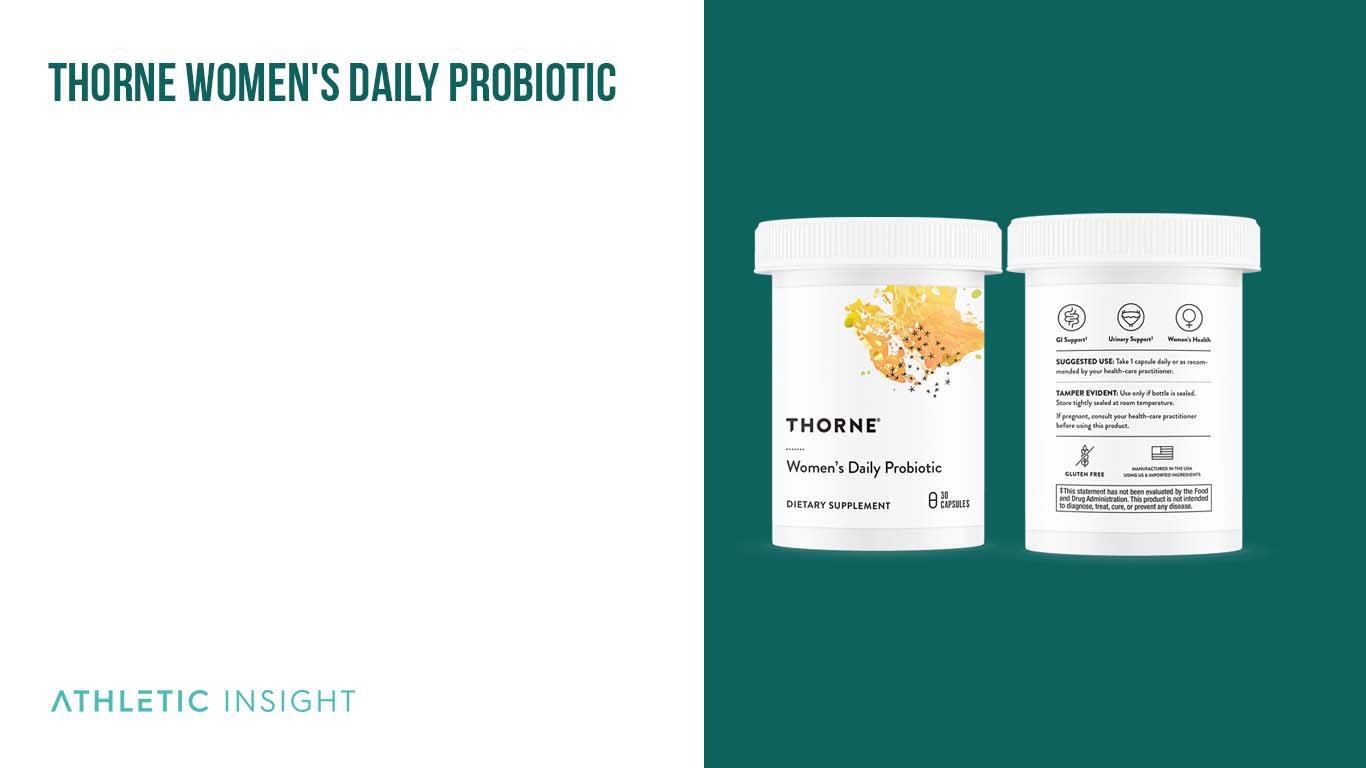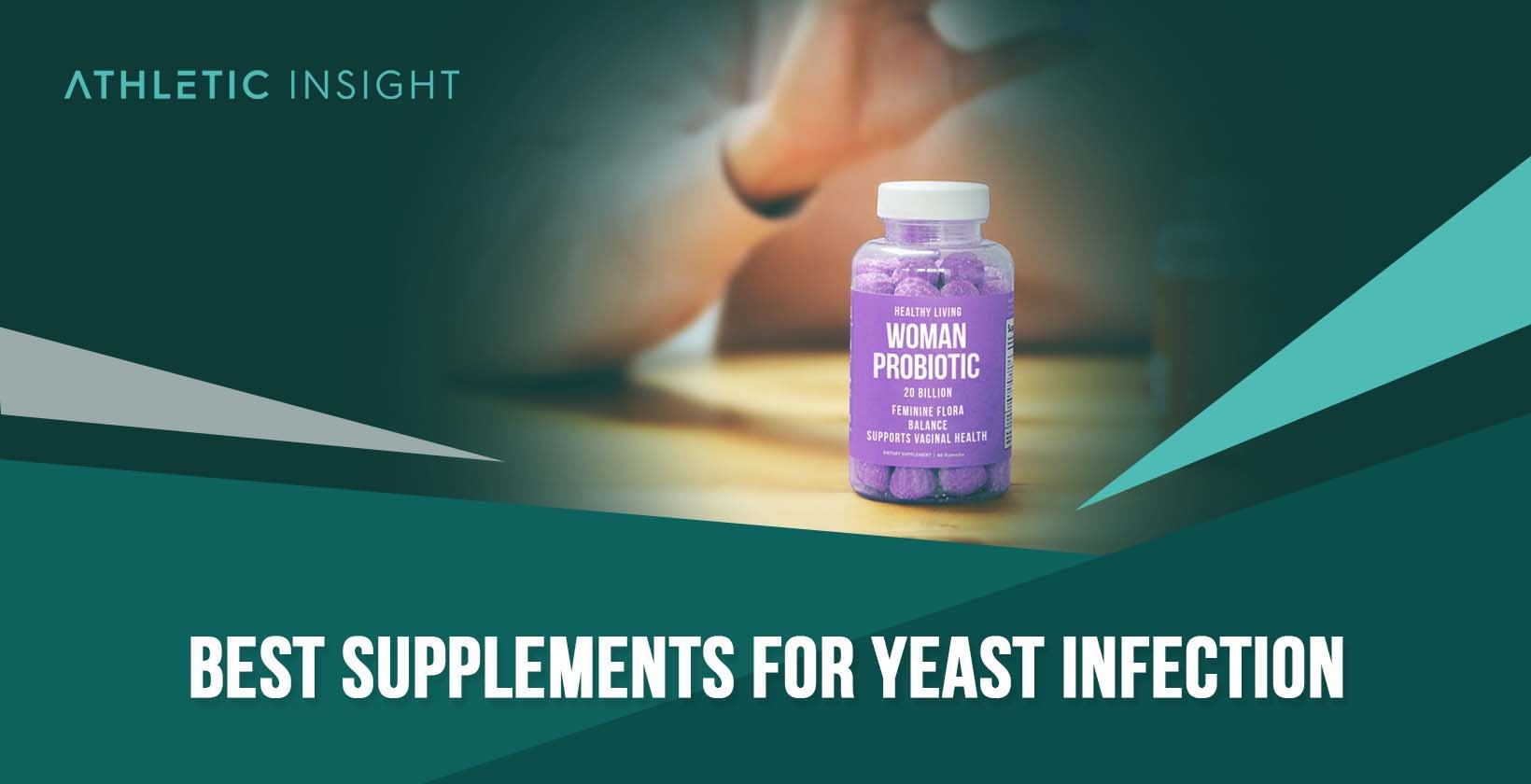Yeast infections, caused primarily by the fungus Candida, can result in a range of uncomfortable symptoms, such as itching, burning, and discharge. While conventional treatments like antifungal medications are effective, many individuals are seeking alternative or complementary options to alleviate symptoms and prevent recurrent infections.
This article will discuss the top supplements for yeast infection management, discussing their features, effects, benefits, side effects, usage, precautions, and associated costs. It’s important to note that while these supplements can be helpful in managing yeast infections, they should not replace traditional medical treatments. Always consult with a healthcare professional before incorporating supplements into your regimen.
1. Thorne Women’s Daily Probiotic
Thorne Women’s Daily Probiotic is a dietary supplement specifically formulated for women’s health. It features a unique blend of probiotic strains designed to support vaginal and urinary tract health, along with overall gut health. By promoting a balanced microbiome, this probiotic supplement can help prevent the overgrowth of Candida, thereby reducing the likelihood of yeast infections.

- Benefits: Supports a healthy balance of vaginal and gut flora, may reduce the occurrence of yeast infections, promotes overall digestive and immune system health.
- Side Effects: Mild gastrointestinal symptoms, such as bloating or gas.
- Usage: Follow the manufacturer’s recommended dosage, typically one capsule daily with or without food.
- Precautions: Consult with a healthcare professional before use, especially if pregnant, nursing, or taking other medications.
- Cost: Varies depending on the retailer, but typically around $30 for a one-month supply.
Overall, Thorne’s Women’s Daily Probiotic is the top choice for yeast infection supplements based on the reviews, cost, ingredients, and certifications. While there are many probiotics, such as Seed, if you are a woman struggling with yeast infections, Thorne is the best choice.
2. Fluconazole
Fluconazole is an antifungal medication available by prescription, commonly used to treat yeast infections. It works by inhibiting the growth of Candida, effectively eradicating the infection. Fluconazole is typically administered as a single oral dose, although the dosage may vary depending on the severity of the infection.
- Benefits: Highly effective in treating yeast infections, fast-acting with rapid symptom relief.
- Side Effects: Nausea, headache, dizziness, gastrointestinal upset, liver damage and severe allergic reactions.
- Usage: Take as prescribed by a healthcare professional, usually a single oral dose for uncomplicated yeast infections.
- Precautions: Consult with a healthcare professional before use and disclose all medications and supplements, as drug interactions may occur. Pregnant or breastfeeding individuals should discuss the risks and benefits with their healthcare provider.
- Cost: Varies depending on insurance coverage and pharmacy, but generally affordable with a prescription.
3. Monistat
Monistat is an over-the-counter antifungal medication available in various forms, such as creams and suppositories. It contains the active ingredient miconazole, which works by interfering with the fungal cell membrane to eliminate the infection. Monistat is available in different treatment durations, including one-day, three-day, and seven-day courses.
- Benefits: Effective in treating yeast infections, available over-the-counter without a prescription, offers various treatment durations for individual preferences.
- Side Effects: Localized irritation or burning at the application site and rarely, allergic reactions may occur.
- Usage: Follow the package instructions for the specific Monistat product, applying the cream or inserting the suppository as directed for the specified treatment duration.
- Precautions: If symptoms do not improve or worsen after treatment, consult a healthcare professional. Avoid using Monistat if you are allergic to its active ingredient, miconazole.
- Cost: Prices vary depending on the treatment duration and retailer, but generally range from $10 to $25 per treatment course.
4. Love Wellness The Killer
Love Wellness The Killer is a boric acid suppository designed to help maintain a healthy vaginal pH, which can be disrupted by yeast infections. By restoring a balanced pH, The Killer can alleviate symptoms and create an inhospitable environment for Candida overgrowth.

- Benefits: Supports a healthy vaginal pH balance, may provide relief from yeast infection symptoms, easy-to-use suppository form.
- Side Effects: Mild vaginal irritation or burning.
- Usage: Insert one suppository vaginally, preferably before bedtime, for the recommended duration specified by the manufacturer or a healthcare professional.
- Precautions: Do not use if pregnant or trying to conceive, and consult with a healthcare professional before use if you have any pre-existing medical conditions or are taking medications.
- Cost: Prices may vary, but a box of 14 suppositories typically costs around $20.
5. Prebiotics and Probiotics
Prebiotics and probiotics are supplements that support a healthy gut microbiome. Prebiotics are non-digestible fibers that serve as food for beneficial bacteria, while probiotics are live bacteria that contribute to a balanced gut flora. By promoting a healthy balance of microorganisms, prebiotic and probiotic supplements can help prevent Candida overgrowth and reduce the risk of yeast infections.
- Benefits: Supports a healthy balance of gut and vaginal flora, may reduce the occurrence of yeast infections, promotes overall digestive and immune system health.
- Side Effects: Mild gastrointestinal symptoms, such as bloating, gas, or diarrhea.
- Usage: Follow the manufacturer’s recommended dosage for the specific prebiotic or probiotic supplement, typically taken orally with or without food.
- Precautions: Consult with a healthcare professional before use, especially if pregnant, nursing, or taking other medications.
- Cost: Varies depending on the brand and product, but generally ranges from $15 to $50 for a one-month supply.
What is the best time to take yeast infection supplements?
The optimal time to take yeast infection supplements depends on the specific product and an individual’s preferences. Generally, it is best to follow the manufacturer’s recommendations or the advice of a healthcare professional. For some supplements, such as probiotics and prebiotics, taking them with meals may aid in digestion and absorption. For others, like boric acid suppositories, nighttime administration may be more comfortable and convenient.

What are the risks of taking supplements to treat yeast infection?
While many supplements for yeast infections are considered safe and well-tolerated, there are potential risks to consider. Some individuals may experience side effects, such as gastrointestinal upset, allergic reactions, or localized irritation.
Supplements can interact with medications or other supplements, potentially leading to adverse effects. It is crucial to consult with a healthcare professional before incorporating supplements into your regimen, especially if you are pregnant, nursing, or taking other medications.
How long does yeast infection supplements take to work?
The time it takes for yeast infection supplements to work can vary depending on the specific product, dosage, and individual factors. Some antifungal medications, such as Fluconazole, can provide symptom relief within a few days, while other supplements, like probiotics, may take several weeks to demonstrate noticeable effects. It is essential to follow the recommended dosage and duration for each supplement and consult a healthcare professional if symptoms do not improve or worsen.
Can supplements truly eliminate yeast infections?
Supplements can play a supportive role in managing yeast infections and promoting overall health. However, they should not be considered a replacement for conventional medical treatments, like antifungal medications.
When used in conjunction with appropriate medical treatment, supplements can help alleviate symptoms, restore a healthy balance of microorganisms, and potentially reduce the risk of recurrent infections. It is crucial to consult with a healthcare professional to determine the most effective treatment plan for your specific needs.
What is the major cause of yeast infection?
The major cause of yeast infections is an overgrowth of the fungus Candida. Candida is a naturally occurring microorganism found on the skin and mucous membranes, but when it multiplies uncontrollably, it can lead to infection. Factors contributing to Candida overgrowth include a weakened immune system, hormonal imbalances, antibiotic use, and poor nutrition. Understanding the etiology of yeast infections is essential for developing targeted treatment strategies.
What are the most effective supplements for treating yeast infections?
The most effective supplements for treating yeast infections include probiotics, antifungal supplements, and specific vitamins and minerals. These supplements work synergistically to restore balance to the body’s microbiome, strengthen the immune system, and directly combat the fungal overgrowth. By incorporating these potent natural remedies, individuals can optimize their body’s resilience against Candida overgrowth and promote overall wellbeing.
How do probiotics help in managing yeast infections?
Probiotics are beneficial bacteria that help maintain a healthy balance of microorganisms in the gut. They play a pivotal role in managing yeast infections by inhibiting the growth of Candida, restoring gut flora balance, and supporting the immune system. Probiotic strains such as Lactobacillus acidophilus and Bifidobacterium bifidum are particularly adept at preventing Candida overgrowth, thus mitigating the risk of yeast infections and supporting overall gut health.
Are there any specific vitamins and minerals that aid in preventing yeast infections?
Yes, specific vitamins and minerals can significantly contribute to preventing yeast infections. Vitamins A, C, D, and E, as well as zinc and selenium, are crucial for maintaining a robust immune system, which is essential for warding off infections. These micronutrients also exhibit antioxidant and anti-inflammatory properties, thereby providing additional defense against Candida overgrowth and facilitating the body’s natural healing processes.
What is the role of antifungal supplements in treating yeast infections?
Antifungal supplements are indispensable in treating yeast infections, as they directly target and eliminate the fungal overgrowth. Natural antifungal compounds, such as caprylic acid, grapefruit seed extract, and oregano oil, are particularly effective in combating Candida. These supplements work by disrupting the cell walls of the fungus, ultimately leading to its demise. Simultaneously, they help restore the body’s microbial balance and prevent recurrence of yeast infections.
Can herbal supplements effectively address yeast infection symptoms?
Yes, herbal supplements can effectively address yeast infection symptoms. Herbs like Pau d’Arco, garlic, and echinacea possess potent antifungal, antimicrobial, and immune-boosting properties that can alleviate the discomfort associated with yeast infections. These botanical remedies not only target the fungal overgrowth but also promote the body’s natural healing mechanisms, offering a holistic approach to managing yeast infections.



